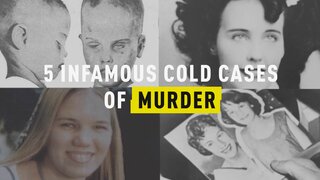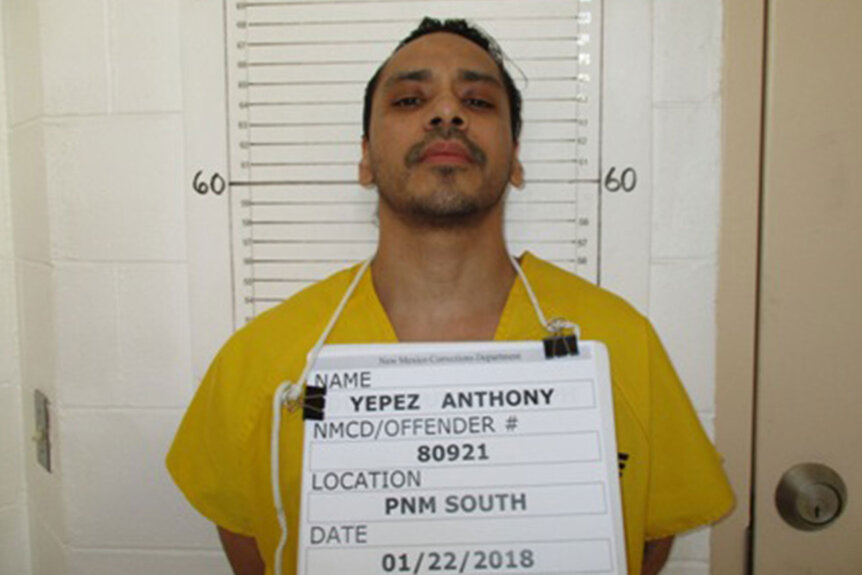Create a free profile to get unlimited access to exclusive videos, breaking news, sweepstakes, and more!
Man Who Choked, Set Fire To Girlfriend's Step-Grandfather Makes Novel ‘Warrior Gene’ Defense
Anthony Yepez was convicted of brutally murdering 75-year-old George Ortiz back in 2012, but his lawyers have argued that he has a genetic predisposition to violence that should be factored into the case.
A New Mexico convict sentenced to 22 years for the 2012 slaying of his girlfriend’s step-grandfather tried to pin the blame on a “warrior gene” that supposedly forced him to black out.
At his 2015 trial, a judge rejected Anthony Yepez’s defense request to present scientific testimony to reinforce the claim that Yepez possessed a so-called warrior gene and therefore had a predisposition for violence.
Yepez was convicted of second-degree murder — defined as intentional murder that lacks premeditation — by a Santa Fe jury for pummeling, choking and then setting fire to his girlfriend’s sickly 75-year-old step-grandfather, George Ortiz, after dousing him in oil inside his senior housing complex.
As the only witness called by the defense to testify, Yepez could only remember bits and pieces of what happened during the Oct. 29, 2012 attack.
He claimed to he didn't know how he ended up squaring off against the step-grandfather of his girlfriend, Jeannie Sandoval. The elderly man reportedly was experiencing signs of dementia, taking multiple medications and using oxygen to breathe, The Santa Fe New Mexican reported.
Yepez said that once he was atop of Ortiz, he found the elderly man suddenly bloody and apparently dead.
“I thought I must have blacked out,” Yepez told jurors at the time. “I’m getting up to my knees. There is blood oozing, just pouring out the back of his head.”
The prosecutor reminded jurors at the time that even if Yepez had lost consciousness, he and Sandoval still had the wherewithal to think about covering their tracks by packing up their possessions and dousing the scene in oil before setting it ablaze.
Sandoval testified against Yepez as part of a plea deal she struck in the case, the New Mexican reported.
The judge ultimately rejected the defense’s argument and refused to allow the jury to hear testimony about the “warrior gene.”
Jurors found Yepez responsible for the homicide and sentenced him to 22 years, but an appeals court ruled in July that the trial judge should have permitted the expert testimony. They ruled that the judge at Yepez's trial may have faltered by excluding the enzyme evidence that the defense argued showed there was no way for him to have premeditation, The Associated Press reported.
However, the same court also noted that the decision to withhold that testimony didn't have any bearing on Yepez getting convicted of second-degree murder and affirmed his sentence.
The criminal or warrior gene theory was first theorized in 1993 by Dutch geneticist, Han Brunner, that some people suffer from a genetic defect crippling a critical enzyme that regulates aggressive behavior, according to an article published in Discover Magazine.
People with that damaged chromosome may then be prone to impulsive violence. The findings also suggest the trait was passed down from mother to son
Yepez’s attorney, Helen Bennett, pushed for experts who would've supported the genetic predisposition argument to be considered, even in relation to the second-degree murder charges.
“This is a due process issue. The defendant was foreclosed from his right to present his theory,” Bennett said, according to the AP.
And while it’s still a theory, Bennett said it still deserved to be presented to the jury.
“It’s grounds for ‘Let the jurors consider the evidence.’ Let’s put it in front of the jurors, let them run it up the flagpole and see what they say,” she said, according to The Santa Fe New Mexican.
For Bennett, the warrior gene theory means more than just a fair trial for Yepez. It could become the “wave of the future” in courtroom cases involving aggressive behavior and acts of violence.
State prosecutors remain skeptical and called the warrior gene defense a “novel and unsubstantiated theory.”
“This theory has been around for some time. No appellate court has accepted it,” said Assistant Attorney General Maris Veidemanis said, according to the AP. “You have this finding of an abuse of discretion, and that to me is risky.”
After the appeal was granted over the summer, the case moved before the state Supreme Court. Those justices heard from both prosecutors and Yepez's defense attorney.
They pressed the defense on the questionable merits of the "warrior gene" theory.
“Where is the tempest,” Justice David Thomson. “I really want to know.”
Justice C. Shannon Bacon called out the defense for bringing up the gene defense far too late.
“There is not even a suggestion in the record for the district court that the defense counsel even whispered about general intent,” he said.
The justices are set to evaluate more briefs before they make a ruling.





























